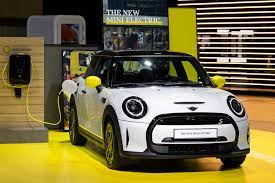Thousands of jobs will be preserved at the Oxford, England Mini factory as a result of BMW’s plans, which were revealed on Monday. The facility has been producing cars there for more than a century.
The facility will be able to start producing two new all-electric models in 2026 before switching over entirely to the production of electric vehicles four years later, according to the German automaker, who said that it will invest 600 million pounds ($751 million) in the project.Following the U.K. government’s decision to invest an undisclosed sum of taxpayer money in the project, the pledge was made.
The British car industry which is trying to compete in the face of an industry-wide move to electric vehicles and the difficulties brought on by the U.K.’s exit from the European Union’s single market will be encouraged by BMW’s intentions.The business’s choice also guarantees that the iconic Mini will continue to be produced in the nation where it was created, even if BMW wants to make the brand entirely electric by 2030.
Milan Nedeljkovic, the board member of the BMW Group responsible for production, stated, “Today we are announcing the new generation of fully electric Minis that are being built here in Oxford, and setting the path for the future of this site.” Business Secretary for the United Kingdom, Kemi Badenoch declined to comment on rumors that the 75 million pounds($94 million) investment would come from the government. According to her, disclosing such information would make it more difficult to negotiate with other businesses as the government looks to attract investments for the manufacture of electric vehicles. By the year 2035, the U.K. government has decreed that only zero-emission automobiles and vans may be sold there.In Oxford, Badenoch told reporters, “What I will say is that we do provide some subsidy, very small support, in the car industry since it faces so many difficulties, some of which are regulatory. We must take it into account if we want manufacturers to move to net zero since doing so adds additional costs and makes it more difficult.
The construction of plants to manufacture the batteries required to power the upcoming generation of electric vehicles is one of the largest challenges facing Britain’s automotive sector.According to data from the Society of Motor Manufacturers and Traders, British car manufacturing fell 40% between 2019 and 2022 as the sector was impacted by COVID-19, Brexit, shortages of computer chips following the pandemic, and the switch to electric vehicles, among other factors.
Although manufacturing has increased this year as chip shortages have decreased, the trade association anticipates yearly production at roughly 840,500 vehicles, down from more than 1.3 million in 2019.The Mini project is the most recent boost for the British automotive industry, which has seen promises to invest more than £6 billion ($7.5 billion) in the country over the last two years.
The tiny crossover Mini Aceman and the Mini Cooper three-door will both be produced in electric form at the Oxford factory, according to BMW.After previous announcements of initiatives in China and Germany, the investment guarantees that Britain will continue to be one of the Mini’s manufacturing centers.
In Oxford, British Motor Corp. started producing the Mini in 1959. The little, two-door vehicle immediately rose to fame as a symbol of 1960s Cool Britannia. Both the original 1969 heist film “The Italian Job” and its 2003 remake featured it.When BMW purchased Rover Group, the successor to British Motor, in 1994, the brand was added to its portfolio.
The head of the Mini brand, Stefanie Wurst, said, “Mini has always been aware of its history – Oxford is and remains the heart of the brand.”


















